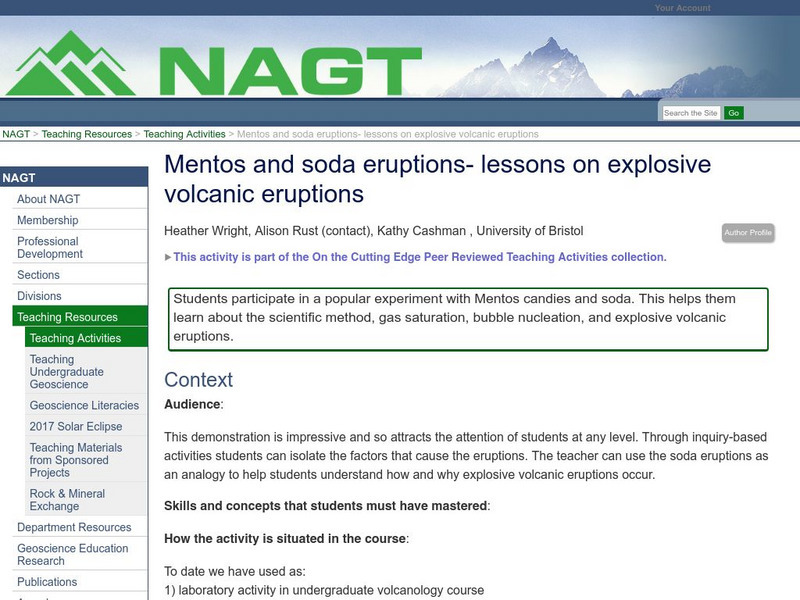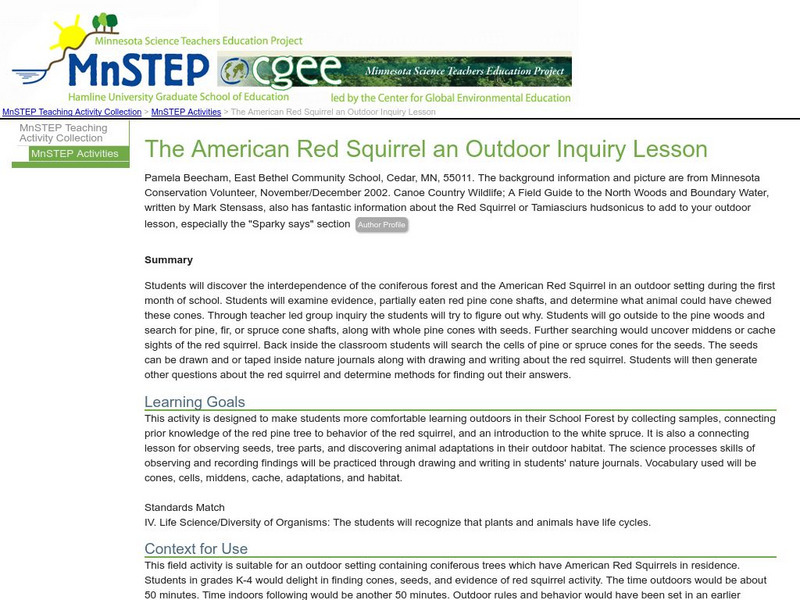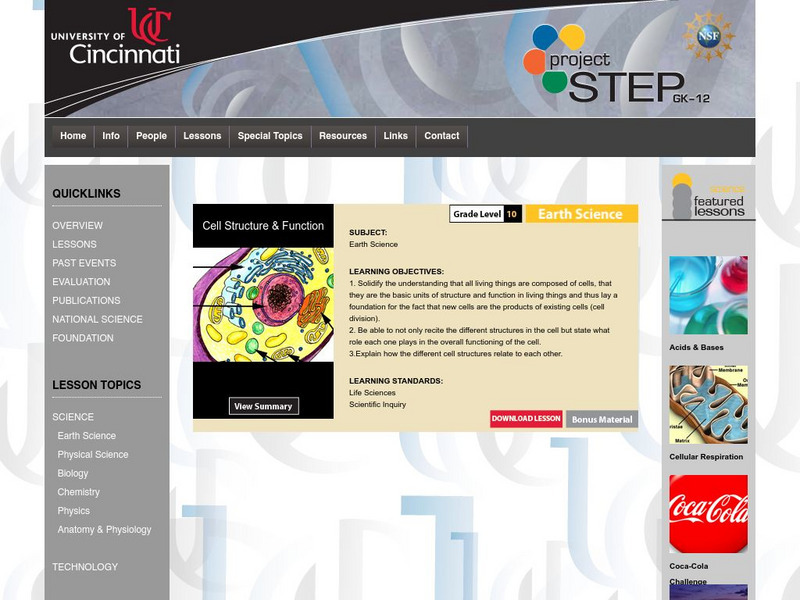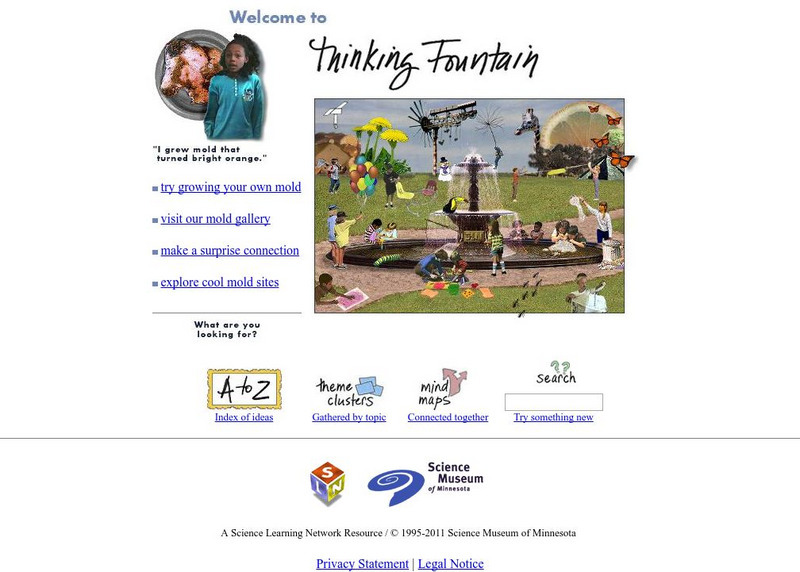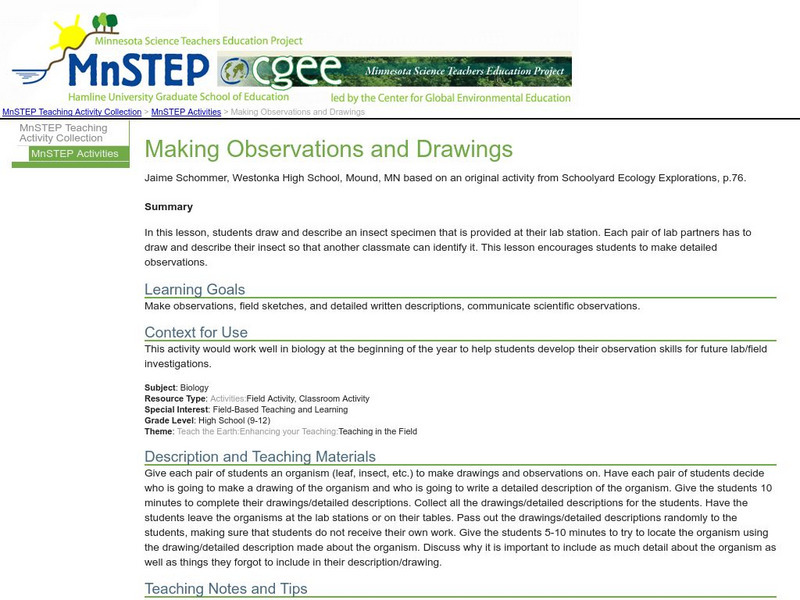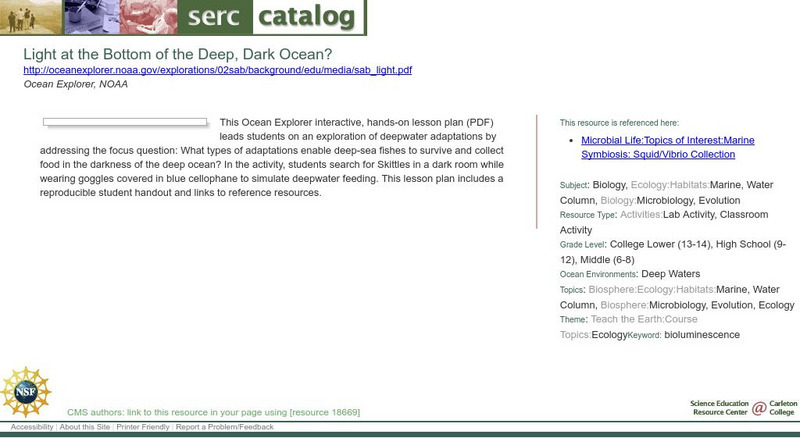Other
American Coal Foundation: Lesson Plan: Generating Electricity From Coal
This two-part lesson teaches students about the process of generating electricity from coal and helps them research and discover alternate ways for using coal to produce electricity.
National Association of Geoscience Teachers
Serc: Mentos and Soda Eruptions: Lessons on Explosive Volcanic Eruptions
Students will learn about volcanic eruptions, the scientific method, gas saturation, and bubble nucleation by participating in a popular experiment with Mentos candies and soda.
Google
Google: Science Fair 2014
An online global competition where students can submit their science fair project. Projects are judged and scored to encourage students to use scientific inquiry. Site also includes a teacher section with lesson plans to help students...
Other
Generation Cures: Pathogens [Pdf]
Students will use scientific inquiry to prevent infection within an organism. At the end of the activity, students will understand cell characteristics, effect of microorganisms and how the body protects against harmful microorganism....
Science Education Resource Center at Carleton College
Serc: Mn Step: The American Red Squirrel an Outdoor Inquiry Lesson
For this activity, pupils are presented with red pine cones that have been partly eaten by the American Red Squirrel, a fact that is not divulged to them at this stage. After a discussion of the possibilities, the class takes a walk in...
ReadWriteThink
Read Write Think: Digging Up Details on Worms: Using Science in an Inquiry Study
A lesson plan based on a study unit of earthworms, using the inquiry model to integrate scientific processes with literacy practices. Instruction plans, related resources, and standards are included.
California Institute of Technology
Infrared Zoo Lesson 2: Dinner in the Dark
After exploring the scenario of how a pit-viper may get his midnight snack, students learn about the infrared sense of a pit-viper. They then discuss how infrared technology has helped in our society.
California Institute of Technology
Infrared Zoo Lesson 1: A Trip to the Infrared Zoo
Students will use infrared images to classify different animals. Students will learn more about infrared imaging and the information it can reveal. This activity is guaranteed to activate great class discussion.
Other
National Geographic: Jason Learning
[Free Registration/Login Required] Educators and students will enjoy visiting the JASON Project, a NASA and National Geographic cooperation which works to provide accurate and intriguing scientific knowledge for students.
Other
Terc: Online Science Athon: Find Out How Tall You Are
Create a Measuring Day at your school and teach your students how to use simple tools to gather, discuss and analyze their own data. This step-by-step lesson plan helps you design an unforgettable day for you and your students. Links to...
Other
University of Cincinnati: Project Step: Cell Structure and Function
Engaging, interactive lesson focusing on cells being the basic units of structure and function of all living things. Students will be able to explain the different roles of each structure and how they relate to each other.
Science Museum of Minnesota
Thinking Fountain
Explore Thinking Fountain's gallery of ideas and lessons, showcase your work in galleries, and find books that you can use with these science inspired activities.
Science Museum of Minnesota
Thinking Fountain
Explore Thinking Fountain's gallery of ideas and lessons, showcase your work in galleries, and find books that you can use with these science inspired activities.
Alabama Learning Exchange
Alex: Science Is a Wonderland
This is an inquiry lesson to teach students critical thinking skills. The student will learn through discovery what inquiry skills are and how they are used. They will learn how scientists use these skills in the scientific method to do...
Albright-Knox Art Gallery
Albright Knox Art Gallery: Kinetic Art Mobiles
Alexander Calder invented two new kinds of sculpture: mobiles and stabiles. In The Cone, he combines elements of each-a stabile, or non-moving sculpture, connected to a mobile, or moving sculpture. In this lesson, students use their...
Science Education Resource Center at Carleton College
Serc: Using Egg Drop Activity to Promote Critical Thinking and Analysis Skills
In this multi-lesson plan hands-on inquiry activity, students will develop their critical thinking skills by designing and constructing an apparatus that will permit an egg to survive a nine foot fall. Given limited materials, they will...
Science Education Resource Center at Carleton College
Serc: Making Observations and Drawings
This lesson will help young scholars develop their scientific observation skills and encourages students to make detailed observations. They will draw and describe insect specimens so another classmate can identify it.
Science Education Resource Center at Carleton College
Serc: Measuring and Graphing Toy Water Animal Growth
Lesson involves scientific investigation and knowledge of units of measurement. Students will select and submerge a growing water animal toy, predicting and measuring its growth of at least three places of metric measurement of distance...
Science Education Resource Center at Carleton College
Serc: Light at the Bottom of the Deep, Dark Ocean?
What types of adaptations enable deep-sea fishes to survive and collect food in the darkness of the deep ocean? Interactive, hands-on lesson plan takes students on an exploration of deepwater adaptations by searching for Skittles in a...
Science Education Resource Center at Carleton College
Serc: Project Nopp Drifters
Data collected by the National Oceanographic Partnership Program (NOPP) can be used by teachers to integrate ocean science into their science and math instruction.This site offers educational activities, curriculum materials, and lesson...
Alabama Learning Exchange
Alex: Touch and Feel: Plant Adaptations
This introductory lesson centers on getting hands-on before getting drug into the vocabulary and nomenclature. In cooperative learning groups young scholars will describe leaves in simple terms. Then, students will use various resources...
Alabama Learning Exchange
Alex: How Many Mice Can an Owl Eat?
As part of the study of the biosphere, the students will use student response systems to determine the average number of mice an owl eats in a day, a week, a month, and a year. This lesson can be used as an introduction or as a review.
Alabama Learning Exchange
Alex: Introduction to the Light Microscope
This is a Microscope Internet Lab that can be used as a virtual lab for a whole class or as a make-up lab. The virtual microscope is a little more complicated than the microscope that is used in the labs but it will not be difficult to...
Alabama Learning Exchange
Alex: How Sweet It Is
As part of the study of Matter, the young scholars will determine the density of standard percent sugar solutions through hands on experimentation. In laboratory groups, students will graph a standardized curve of the experimental data....

